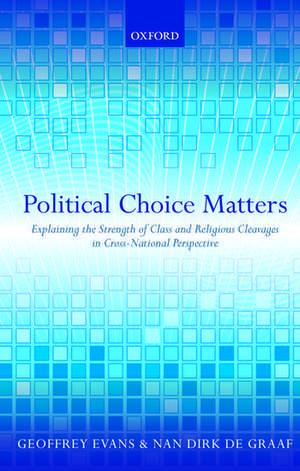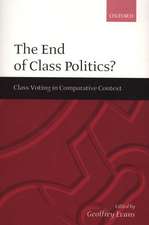Political Choice Matters: Explaining the Strength of Class and Religious Cleavages in Cross-National Perspective
Editat de Geoffrey Evans, Nan Dirk de Graafen Limba Engleză Hardback – 28 mar 2013
Preț: 867.59 lei
Preț vechi: 1243.70 lei
-30% Nou
Puncte Express: 1301
Preț estimativ în valută:
166.07€ • 180.45$ • 139.59£
166.07€ • 180.45$ • 139.59£
Carte disponibilă
Livrare economică 21-27 martie
Preluare comenzi: 021 569.72.76
Specificații
ISBN-13: 9780199663996
ISBN-10: 0199663998
Pagini: 472
Dimensiuni: 162 x 240 x 31 mm
Greutate: 0.86 kg
Editura: OUP OXFORD
Colecția OUP Oxford
Locul publicării:Oxford, United Kingdom
ISBN-10: 0199663998
Pagini: 472
Dimensiuni: 162 x 240 x 31 mm
Greutate: 0.86 kg
Editura: OUP OXFORD
Colecția OUP Oxford
Locul publicării:Oxford, United Kingdom
Recenzii
The electoral coalitions assembled by parties of different ideological stripes in todays established Western democracies are not simply a reflection of cross-national or inter-temporal differences in social structure; they also respond to the programmatic appeals of the parties, and more specifically the strategic configuration of programmatic moderation or polarization among them. Drawing on the most comprehensive cross-national and cross-time dataset available to date, and supplemented by a battery of meticulous case studies, this book drives home this crucial point in a more convincing way than any previous study. It is required reading for anyone probing into the realignments of partisan politics in postindustrial democracies and looking for methodological guidance in advancing that enterprise.
The question have the effects of social cleavages declined, and if so, how and with what consequences? is fundamental to political sociology, but political scientists and sociologists approach it in different ways and reach different conclusions, often talking past each other in the process. This book bridges the gap by focusing on the values (ideological and social) in the causal chain that links class and religion with party choice. This enables the authors to address both the individual and party aspects of cleavages. Their investigations are conducted in a variety of advanced democracies and on pooled time series data. The result is a powerful synthesis that will be required reading for scholars of both disciplines.
Issues of social cleavages and their electoral consequences are central to the study of modern democracies. Both theoretically and empirically, this collection is the most important contribution to date to the analysis of these issues. Rival accounts of shifts in cleavage politics in terms of social structural and cultural change or party strategies that determine how far voters can in fact express their class or religious interests, are rigorously formulated and evaluated using both cross-national analyses and national case studies. Quantitative sophistication is combined with sensitivity to institutional and historical specificities. The collection is essential reading for a wide range of social scientists, not to mention party leaders and their advisers.
take this book not only as a significant milestone, but also as a springboard to invent new indicators of class and party politics.
The question have the effects of social cleavages declined, and if so, how and with what consequences? is fundamental to political sociology, but political scientists and sociologists approach it in different ways and reach different conclusions, often talking past each other in the process. This book bridges the gap by focusing on the values (ideological and social) in the causal chain that links class and religion with party choice. This enables the authors to address both the individual and party aspects of cleavages. Their investigations are conducted in a variety of advanced democracies and on pooled time series data. The result is a powerful synthesis that will be required reading for scholars of both disciplines.
Issues of social cleavages and their electoral consequences are central to the study of modern democracies. Both theoretically and empirically, this collection is the most important contribution to date to the analysis of these issues. Rival accounts of shifts in cleavage politics in terms of social structural and cultural change or party strategies that determine how far voters can in fact express their class or religious interests, are rigorously formulated and evaluated using both cross-national analyses and national case studies. Quantitative sophistication is combined with sensitivity to institutional and historical specificities. The collection is essential reading for a wide range of social scientists, not to mention party leaders and their advisers.
take this book not only as a significant milestone, but also as a springboard to invent new indicators of class and party politics.
Notă biografică
Geoffrey Evans' research interests include social divisions, inequality, and politics in Britain, models of voting behaviour, the evolution of class and ethno-religious cleavages, and democratic consolidation in postcommunist societies. In addition to many journal articles covering these topics he has produced several books including The End of Class Politics? (OUP 1999). He is University Professor and Official Fellow, Nuffield College, Oxford. Nan Dirk De Graaf's research interests include empirical sociology in general, social stratification, especially educational attainment and consequences of social mobility, cultural sociology, sociology of religion and pro-social behaviour, and political sociology and criminology. He is University Professor and Official Fellow Nuffield College, Oxford.












